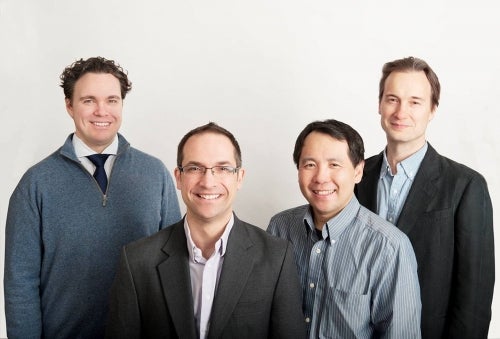
Four Waterloo engineering classmates are working together to reimagine medical technology in operating rooms across North America.
Their Toronto-based company, Synaptive Medical, was founded in 2012 and makes a suite of medical devices that use state-of-the-art imaging and robotics technology to bring brain and spine surgery into the 21st century. Synaptive’s imaging system maps the brain’s vital pathways to create 3D renderings allowing for more accurate surgery such as tumour removal, while a Canadarm-like robotic arm and digital microscope gives surgeons an unprecedented view during an operation.
Cameron Piron (BASc ’98), Synaptive’s president and co-founder, and three of the company’s senior team are Waterloo alumni: Josh Richmond (BASc ’98), Kai Hynna (BASc ’98) and Thanh Vuong (BASc’98, MASc ’02).
Alumni Relations caught up with them to talk about life after Waterloo and the company’s success.
-----------------------------------------------------------------------------------
The four of you were systems design engineering classmates here at Waterloo. How is it you all came together again at Synaptive Medical?
Cameron: Synaptive is made up of teams of teams: it’s a real network effect. We established a kinship and friendship at Waterloo that has carried over into our professional lives.
Josh: I worked at Sentinelle Medical, Cameron’s first company. It was acquired and we both left in 2012. Then he called me up to tell me about Synaptive and I jumped right in during early 2013. We were 10 people then and we’re about 300 now.
Thanh: I’ve been with Synaptive since 2013, but my first job out of undergrad was at Blackberry/RIM. I was there for 15 years and saw it grow from 200 people to 20,000. Josh reached out to me and because of the RIM downsizing, I interviewed with Synaptive. It’s cool to work with classmates to change the world. You never think it will happen, but all our paths led here.
Kai: I was looking to move on from another start-up where I had been working with another two systems graduates from our class, so the timing was perfect. Cameron brought me on board in summer of 2013.
Last summer, Synaptive Medical received recent Health Canada approval for your product suite. What does that bode for the company’s future?
Cameron: The approval is important because it’s essential to be able to innovate in Canada alongside our clinical partners here. We’re proud of our technology and are excited it can now help Canadian patients.
Kai: Selling in Canada is a real bonus for any Canadian company, particularly in medical technology.
Josh: It makes it possible for us to work more closely with hospitals nearby, makes it easier to work with surgeons to get their feedback and make iterative improvements. We continue to work with surgeons here and in the United States, our first market.
Thanh: The approval gives us leverage when making inroads in other countries. It’s good for international growth.
Did anything or anyone at the University of Waterloo influence your entrepreneurial aspirations or prepare you for Synaptive?
Josh: I think all of us had entrepreneurial aspirations. I think Waterloo draws entrepreneurially-minded people, and the co-op placements help foster that mindset. The kind of projects I saw during a March Break visit were all entrepreneurial.
Cameron: Studying systems design prepared us for the med tech industry. It taught us about bringing together different disparate elements of a system and integrating them.
Thanh: Within our program, the workshops and some courses were project based and got us thinking about real-world problems. For one project, we partnered with Grand River Hospital and a doctor came in and said, “Here is a problem, try and help us solve it.” And that’s exactly what we do now. My co-op placements helped me try different jobs and industries, experiment and assess my strengths and weaknesses
Synaptive Medical hires a slate of co-op students each term. Why is that important?
Cameron: It’s the future of our company. We’re very focused on making sure we have the best people and co-op recruitment is a part of that.
Josh: Yes, we have a lot to do here and Waterloo students are really great. They’re experienced and they don’t need much training to become very productive very quickly. It’s something we look for when interviewing junior hires. That kind of experience in your undergrad can count for a lot.
Thanh: Sometimes it counts for more than academic experience.
What advice do you have for aspiring graduates of the medical entrepreneurial field?
Kai: It’s a tough slog, but don’t give up!
Thanh: Gain experience working for a medical device company as a junior person and be a sponge. Figure out what your niche is and what you want to do.
Josh: Don’t be intimidated by the regulatory requirements. In many ways, they just encapsulate good engineering practices. In the current ecosystem for makers and hackers, it’s much easier than ever before to create a hardware device without a lot of capital. And stay in touch with your old classmates. You never know when you may work together again.
Cameron: Never forget that opportunities in this field are tremendous, and success is very much aligned with finding experienced mentors who can help you work through problems much more quickly. We were shaped by that mentorship experience at Waterloo have made it part of Synaptive.




